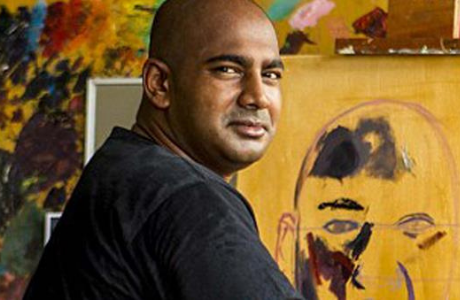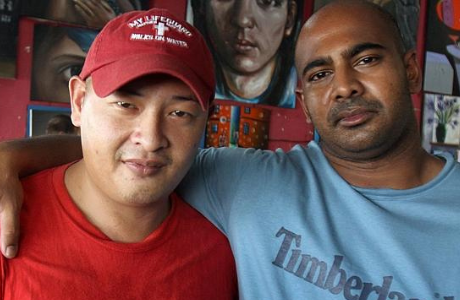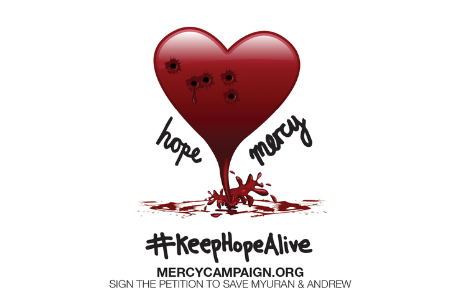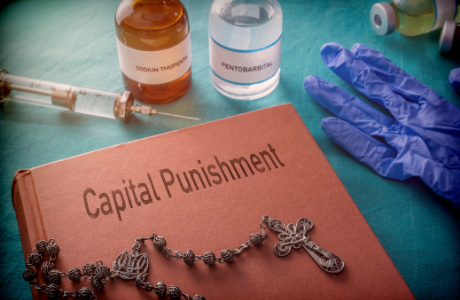There’s no doubt that members of the Bali Nine were guilty. Andrew Chan and Myuran Sukumaran were both given the death sentence, Renee Lawrence received twenty years and the rest are serving life. Andrew and Myuran were executed just after midnight on 29 April 2015.
For my wife Christie and I (and many others) it’s still hard to believe that our dear friends are no longer with us. However, we are encouraged by their legacy that lives on in the continuance of the projects they pioneered, as well as the lives of hundreds of people they helped rehabilitate. This legacy is beautifully portrayed in a new book, The Pastor and the Painter by Cindy Wockner,[1] and also by the movie, Guilty, which chronicles Myuran’s final 72 hours.[2]
Guilty will be screened in cinemas across Australia on 10 October, The World Day Against the Death Penalty, to raise awareness of the plight of those on death row and the suffering that is inflicted on their families. [3]
Speaking for the Voiceless
 Both Andrew and Myuran were fiercely opposed to the death penalty and asked their family and friends to continue to advocate against it. That is why Christie and I keep speaking out whenever we have the opportunity to do so. The 16th World Day Against the Death Penalty on 10 October “aims at raising awareness on the inhumane living conditions of people sentenced to death,” and rightly so.[4]
Both Andrew and Myuran were fiercely opposed to the death penalty and asked their family and friends to continue to advocate against it. That is why Christie and I keep speaking out whenever we have the opportunity to do so. The 16th World Day Against the Death Penalty on 10 October “aims at raising awareness on the inhumane living conditions of people sentenced to death,” and rightly so.[4]
Death row prisoners experience solitary confinement in the United States and overcrowded conditions in many African and Asian countries. “Very often, death row prisoners become human beings on which the society does not invest anymore, as if, even before being executed, they were no longer alive, they were no longer considered as human beings.”[5]
By the end of last year, at least 21,919 people were known to be on death row. Many of these people were sentenced at trials that didn’t meet international “Fair Trial” standards. This included extraction of confessions through torture and other forms of ill-treatment and so capital punishment isn’t just a matter of being tough on crime as some suggest, it’s an issue of gross abuses of human rights.
China continues to be the world’s worst executioner where thousands of people are thought to be killed every year. Apart from China, 84% of executions last year were carried out in four countries: Iran, Saudi Arabia, Iraq and Pakistan. “Across Asia Pacific, the death penalty was extensively used for offences that did not meet the threshold of the “most serious crimes”, going against international law.” [6]
Why I Stand Against It
And so, for these and other reasons I will continue to advocate against the death penalty:
- It is irreversible: it carries the risk of executing someone who is innocent.
- It is unfair: it is used disproportionately against the poor, people with intellectual or mental disabilities and minority groups; and denies any possibility of rehabilitation. It also punishes the innocent families of those killed.
- It is ineffective: it does not act as a deterrent. For example, Indonesia’s drug problem is getting worse in spite of its executions.[7]
- It is costly: in western countries like the USA, it is cheaper to keep someone in jail for the rest of their life than to have them executed.
I’m so proud of the Australian government’s initiative to abolish the death penalty worldwide. “Australia opposes the death penalty in all circumstances for all people. We support the universal abolition of the death penalty and are committed to pursuing this goal through all the avenues available to us.” [8]
If you want to make a difference, take some time to read Australia’s Strategy for Abolition of the Death Penalty, and contact your local Federal Member to thank them for their stand on this issue. I also encourage you to book into GUILTY on October 10th at either Village Cinema Southland, or Village Cinema Karingal. At the Southland screening, I’ll be interviewing Julian McMahon and Christie Buckingham before the film starts.
[1] https://www.hachette.com.au/cindy-wockner/the-pastor-and-the-painter
[2] https://www.youtube.com/watch?v=-fG9LsQRCv4
[3] https://au.demand.film/guilty/
[4] http://www.worldcoalition.org/worldday.html
[5] Ibid
[6] https://www.amnesty.org/en/latest/news/2018/04/death-penalty-facts-and-figures-2017/
[7] https://www.scmp.com/lifestyle/article/2120688/why-indonesias-drugs-problem-getting-worse-despite-shoot-sight-orders-and
[8] https://dfat.gov.au/international-relations/themes/human-rights/Pages/australias-strategy-for-abolition-of-the-death-penalty.aspx







